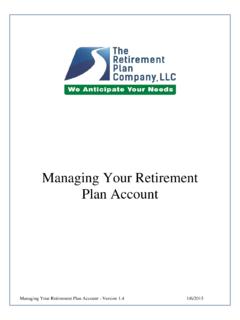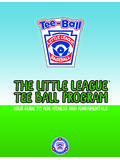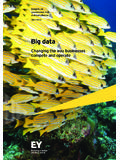Transcription of ACCESSIBLE EVENTS - meetingsevents.com.au
1 ACCESSIBLE EVENTSA Guide For Meeting and Event Organisers2 ACCESSIBLE EVENTS - A Guide for Meeting and Event OrganisersFOrEwOrdEvents such as conferences, festivals, annual meetings, award ceremonies, fundraisers and seminars are big business and an important part of the lives of many Guide, which has been developed by the Meetings and EVENTS Industry of Australia in partnership with the Australian Human rights Commission, is designed to help those responsible for organising EVENTS and to ensure they are ACCESSIBLE for people with disabilities - whether they are presenters, sponsors or is based on the experience of organisers who are responsible for creating ACCESSIBLE both state/territory and Federal law, making EVENTS ACCESSIBLE for people with disabilities is a legal requirement, but with approximately four million people with disabilities in Australia who have significant spending power, providing access is also an important commercial wanting to make an event more ACCESSIBLE often have difficulty in finding out what they can do to ensure the best possible access is hope that this guide will help you to do P Gaunt CEO Meetings and EVENTS Australia October 2012 Feedbackreaders are invited to submit their ideas and suggestions for making EVENTS more ACCESSIBLE for people with disabilities.
2 Please let us know how useful you found this forward comments to: EVENTS - A Guide for Meeting and Event Organisers 3 CONTENTSS ection 1 About this GuideSection 2 why should I think about access?Section 3 what the Law saysSection 4 Thinking about access in the early planning stagesSection 5 The venueSection 6 Transport getting there and getting awaySection 7 Promoting your eventSection 8 Tickets, booking and registrationSection 9 Making information accessibleSection 10 The TeamSection 11 Sound, lighting and other technologySection 12 Additional servicesSection 13 AcknowledgementsSection 14 GlossarySection 15 Further information and contacts Appendices - Checklists4 ACCESSIBLE EVENTS - A Guide for Meeting and Event OrganisersSection 1 ABOUT THIS GUIdEThis practical Guide aims to help you to make EVENTS more ACCESSIBLE for people with disabilities who may be attending as presenters.
3 Participants or sponsors. It gives information and guidance on best practice that will open up to you a section of your potential market that is often overlooked, and help you to meet your existing legal Guide does not attempt to list everything that will need to be done for every type of event. It is not designed as a technical checklist covering detailed specifications. Instead, it outlines principles that will lead to the development of best practice and increase access for people with disabilities to a range of guide aims to help you: think about access and participation when you plan an event; identify features that make it impossible or difficult for people with disabilities to access your event; understand what you can do to ensure the best possible access; understand the relevance of the Disability Discrimination Act 1992 (DDA) and state/territory anti-discrimination laws.
4 Find further sources of advice, information and assistance you might of an eventThis Guide uses the term event(s) to cover the broad range of functions such as exhibitions, conferences, awards ceremonies, Annual General Meetings, film festivals, fundraisers, outdoor concerts and local community street fairs. The Guide uses the term event organiser to describe the person or organisation hosting the should use this Guide?This Guide will be useful to anybody who is involved in organising EVENTS whatever the nature, size or location of the event. You might be a professional organiser of EVENTS like conferences or exhibitions, a Government department or local authority, a voluntary organisation, or chair of a local fundraising group. You will also find this Guide useful if you are a student of event or hospitality EVENTS - A Guide for Meeting and Event Organisers 5 Section 2wHY SHOULd YOU THINk ABOUT ACCESS?
5 There are many reasons why you should think about access and how you plan to meet the requirements of people with disabilities: There are around four million people with disabilities in Australia representing a considerable proportion of your potential audience or customers. People with disabilities can also influence the choices of their families and friends if they have had a previous bad experience. Everyone benefits when access is better, including other attendees, people making deliveries, people with heavy baggage, families with young children and those with prams. Our population is ageing and as we age our capacities change. The proportion of Australia s population aged over 65 years has grown from 8% in 1970-71 to 13% in 2001-02. Projections are that over the next 40 years, the proportion of the population over 65 years will almost double to around 25%.
6 More and more of us will benefit from good access to the EVENTS we want to participate in. Under the law you have a legal responsibility to prevent discrimination against people with disabilities. Complaints of discrimination could result in costly court proceedings and the needs of potential participants in an event are taken into account at the earliest planning stages the better the chances of making it genuinely ACCESSIBLE and significantly reducing the potential for future ACCESSIBLE EVENTS - A Guide for Meeting and Event OrganisersSection 3wHAT dOES THE LAw SAY?while all states and territories have similar laws that prohibit discrimination, this section provides a brief overview of the Federal Disability Discrimination Act 1992 (ddA). The ddA aims to ensure that people with disabilities are not treated less favorably than people who do not have a ddA covers areas such as employment, access to goods, services and facilities, education, access to premises and transport.
7 The DDA defines disability very broadly and includes, for example: people who are blind or vision impaired; people who are deaf or hearing impaired; people with intellectual and learning disabilities; people with mobility and manual dexterity difficulties; people with psychiatric disabilities; people who have a brain injury; people who have epilepsy; and people who have a disease-causing organism such as the HIV providers, such as EVENTS organisers and sponsors have a legal responsibility under state/territory and Federal laws to avoid discriminating and, when barriers exist, to remove sort of access problems might there be?Access for people with disabilities is not only about physical access to buildings for wheelchair users, but also includes, for example, access to written information for people with vision impairments and access to public announcements for deaf following are examples of actions that might lead to discrimination complaints: door stewards at a rock concert refuse entry to a ticket holder because he has cerebral palsy and has difficulty controlling and co-ordinating his movements.
8 A conference centre only provides a self-service buffet at lunchtime for delegates. Some people with mobility impairments or vision impairments may find it difficult or impossible to carry or hold food from a buffet selection and to eat without placing their plate on a table. An awards ceremony takes place on a platform that can only be accessed by two steps so a graduate who uses a wheelchair cannot participate in the ceremony in the same way other students can. Motions being put to an important company general meeting are only available as printed material making it difficult for a blind shareholder to participate in the debate. The keynote speech at a conference is delivered in a room with no hearing augmentation system for people with a hearing impairment. A senior staff member of a major conference sponsor has to go to another building to find an ACCESSIBLE EVENTS - A Guide for Meeting and Event Organisers 7 Who is responsible for making sure an event is ACCESSIBLE ?
9 If you run an event you are a service provider and you will be the person responsible for making sure the event is is reasonably straightforward where, for example, an event organiser holds an event in their own premises and provides all the services such as information, catering, staff and entertainment. However, in other cases, there will be a number of service providers involved in a single event. The following examples help to illustrate : A council is running a program of consultation EVENTS for people living in the local area. It is hosting these meetings in community centres that it owns and operates. The service provider is the local council and it would be responsible for ensuring that each event, including the content of the consultation and any supporting materials, are ACCESSIBLE for people with : Food is available to buy from a burger van at an agricultural show.
10 The fast food van was invited to attend by the show organisers and to provide hot food at the event. The service provider in this situation is the owner of the van and he or she may have responsibilities under the ddA to ensure that people with disabilities can get access to the fast food service being : An exhibition organiser rents out exhibition stand space to companies wishing to be represented at the exhibition. The exhibition organiser would be responsible for ensuring that the exhibition stand spaces are ACCESSIBLE , but the exhibitors might be responsible for ensuring that the services provided in the stand space are : The organiser of an international two-day conference offers to make hotel bookings for delegates. The organiser is providing a hotel booking service and it will be responsible for ensuring that the booking service itself is ACCESSIBLE to people with disabilities.






